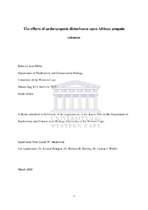| dc.contributor.advisor | Maneveldt, Gavin W. | |
| dc.contributor.advisor | Pichegru, Lorien | |
| dc.contributor.advisor | Sherley, Richard B. | |
| dc.contributor.advisor | Waller, Lauren J. | |
| dc.contributor.author | Miller, Rebecca Jane | |
| dc.date.accessioned | 2021-02-22T09:34:07Z | |
| dc.date.available | 2021-02-22T09:34:07Z | |
| dc.date.issued | 2020 | |
| dc.identifier.uri | http://hdl.handle.net/11394/7851 | |
| dc.description | Magister Scientiae (Biodiversity and Conservation Biology) - MSc (Biodiv and Cons Biol) | en_US |
| dc.description.abstract | African penguin (Spheniscus demersus) mainland colonies are a popular tourist attraction in the Western Cape of South Africa. The African penguin population is in decline and the species is listed as endangered on the International Union for the Conservation of Nature (IUCN) Red List. This thesis aimed to investigate the impact of ecotourism upon African penguin colonies by comparing two colonies of differing levels of tourist visitation in the Western Cape in 2017. The high visitation colony is a mainland colony where ecotourism activities take place (Stony Point), and the low visitation colony is an island colony where ecotourism does not occur (Robben Island). As well as inter-colony comparisons, nests at the high visitation colony within areas of differing exposure levels were also compared. | en_US |
| dc.language.iso | en | en_US |
| dc.publisher | University of Western Cape | en_US |
| dc.subject | Anthropogenic disturbance | en_US |
| dc.subject | African penguin | en_US |
| dc.subject | Western Cape | en_US |
| dc.subject | Ecotourism | en_US |
| dc.title | The effects of anthropogenic disturbance upon African penguin colonies | en_US |
| dc.rights.holder | University of Western Cape | en_US |

